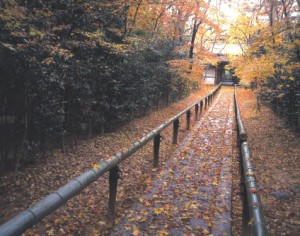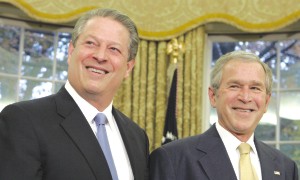| One off
The American Journey (Part Il)
Beyond the First Movement
Aly Zaker
 The first movement of the sonata is often followed by the exposition and recapitulation. I have no such skill or scheme. My Autumn Sonata of the US cannot be extended. It died with the leaves falling, trees now looking barren and people going off the street as soon as work was over, eagerly looking forward to be tucked within the warmth of their four walls. Now begins the period of hibernation and reflection. It was precisely 10 years ago about now that I was in the States. That was another autumn with vivid colours everywhere as is natural in that part of the world during that time of the year. The first movement of the sonata is often followed by the exposition and recapitulation. I have no such skill or scheme. My Autumn Sonata of the US cannot be extended. It died with the leaves falling, trees now looking barren and people going off the street as soon as work was over, eagerly looking forward to be tucked within the warmth of their four walls. Now begins the period of hibernation and reflection. It was precisely 10 years ago about now that I was in the States. That was another autumn with vivid colours everywhere as is natural in that part of the world during that time of the year.
I was very lucky to have been driven up north to Vermont from New York by my hosts. A remarkable and glorious fall as the Americans would call it, that autumn was even more colourful because of yet another reason. That year, the year 2000, on the 7th of November, the US Presidential election was held. This election generated a lot of steam to say the least. Most people that I know in the States are supporters of the Democratic Party. I had yet to come across any Bengali who supported the Republicans. This is because, and I would hazard a guess here, the Bengalis living there feel that the Democrats being liberal are more sensitive toward the marginalised immigrants. In the autumn of 2000, things were not different. Most Bengalis that I knew in the US were of the same opinion. But most Bengalis that I was close with did not comprise the real 'most'! So, Bengalis being as they are, overtly political, I wanted to know a little more of the political thoughts of the vast majority of the Bengali population that was unknown to me. Well, I had very limited access there. But because I am very keen to visit the hub of the Bangladeshis living in New York, to have a feel of how my Deshi brothers were faring there, I went to meet a couple of common friends over a cup of tea in a typical Bangladeshi restaurant at the county of Queens.
Though my visit seemed apparently innocuous and without a purpose, I had an agenda. I wanted to find out how the common Bangladeshis felt about the forthcoming Presidential election in the US and the reason thereof and to assess their views on whom would they like to see as the next President there. This was important because this was the segment of Bengali speaking populace that had a substantial vote bank. I guessed that they, like most Bengalis I knew, would perhaps be favouring Al-Gore over Bush. But I was surprised to find that the acquaintances of mine who had gathered in that teashop that afternoon were very different from the better-off Bengalis in their choice of the next President. They, much to their embarrassment, confided in me that they'd chosen Bush over Gore. When I asked why, their answer came as a counter question – “Why did Gore choose Lieberman as his running mate?”
What was wrong with Lieberman? He was a Jew. And Jews cannot be friends of the Muslims. I have seen that, in matters of faith, logic often fades out into oblivion. I am not interested in American politics. I never was; but thought that this was a strange reason why they would side with a very conservative Republican against a relatively liberal Democrat. They could not convince me of the fact that Bush with a Christian running mate would be more conducive to the Muslims of the world than Al-Gore with a Jewish running mate. So we decided to part company. The rest is history.
 |
They could not convince me of the fact that Bush with a Christian running mate would be more conducive to the Muslims of the world than Al-Gore with a Jewish running mate.
|
Just as I feel that the Bangladeshis abroad are asset for our country; in most conceivable ways, I also am pained at times by their foolhardy attitude. Both my friends in the teashop that afternoon were qualified engineers but even they were victims of irrationality. Instead of engaging their fellow countrymen in dialogues to help them see the light of logic they also joined in the groove of thoughtlessness. In the Colombia University, not very far from where most of them live there is a very active forum of the South Asians who organize various seminars, fairs and discussion sessions regularly. I have, during my visits to New York, attended a couple of such discussions.
They are usually very well attended. I have seen a fair amount of South Asian representation in these except for the presence of a single Bangladeshi. There is very little effort from the mainstream Bangladeshis to let others know us. And I can't attribute this to lack of education on their part. Even educated and culturally oriented Bangladeshis shy away from trying to know their non-Bengali neighbours whereas there is enormous scope for knowing each other through increased cultural exchanges even within the community. We have been to the USA to perform our plays a number of times.
Usually these are organised by the expatriate Bangladeshis for their own entertainment. I have often suggested that the enthusiasts there could go a step further and organize some Bangla plays or poems to be read or performed in English so that the English speaking population could have an idea about what the liberal Bangladesh, born out of a protracted battle and born as a liberal secular country, really is. They could know about our rich cultural heritage – our history, literature, philosophy and civilization. And a lot of misgivings could have been alleviated. I do agree that we cannot draw a huge crowd in such shows but it will draw the interest of sufficient number of people who are interested to know about us and may become our genuine friends. And this would snow ball. There is no dearth of intellect in Bangladesh. It only needs exposure. Through such exercises we may also enlighten the second and third generation Bangladeshis abroad about the culture and literature that is so rich and something that can connect them to their roots.
After my conversation in the teashop at Queens that afternoon I became depressed. Our conversation that started with the American election had covered all those that I have discussed above and all those that reflect the ideals and values that Bangladesh was born to embody and failed to hold on to a vast majority of our expatriate Bangladeshis. I came out of the conversation a hapless man. The colourful autumn seemed to have lost all colours. As I started walking back slowly towards the subway station, the trees seemed bereft of leaves and life.
Copyright
(R) thedailystar.net 2010 |
